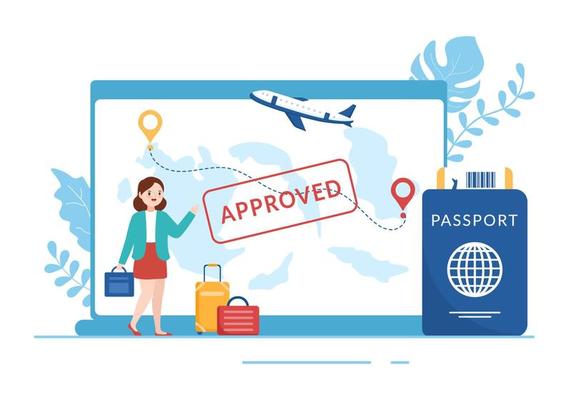Moving to study abroad can be a very exciting journey to embark on. It means more exposure, people, career advancement, and language learning. It can also greatly improve your CV.
As enticing as it may seem, moving abroad to study also comes with a lot of requirements and preparation. You’d be moving entirely somewhere new, right? We know it can be quite overwhelming. In this article, we will take a look at things you must know before you start planning and putting your bags together. Here’s the checklist:
- Apply for a passport and Visa
- Research your preferred schools and apply
- Get your required documents ready
- Research the culture and people in your intended destination
- Buy a plane ticket
- Visit a health facility
- Get travel insurance
- Secure housing
- Financial considerations
- Find out what language is used at your intended destination
- Prepare yourself mentally
- What to include in your travel luggage • Staying in touch with home
Apply For A Passport And Visa
You must have a Visa to travel abroad for studies. If you already own a passport, double-check to make sure that it is not due to expire in another 6 months from the date you intend to travel. Also, make sure that there are blank pages left in your passport. If you don’t already have one, you can apply directly at selected locations in your country of residence. You can apply for a Visa at a county’s embassy in Nigeria. Note that visa requirements for each country vary, so you need to look up Visa requirements for your intended country of study.
Research Your Preferred Schools And Apply
You have to do some research on schools available in your intended study location. If you’re looking to attend a private university or college, then search for private schools in the location of your choice. Also, check for their fees and decide if they’re in line with your budget. After your research, select the schools that best match your needs and financial capability. If you’re going for public schools, repeat the same process and arrive at a decision.
Get Your Required Documents Ready And Apply
Before selecting schools to apply to, find out about the student community. Ask yourself if it is an environment you can cope in. Listen to what some of the alumni have to say. This would help in deciding whether to study at the institution or not. Make sure to start your application early enough as the process may require some time.
All courses have different requirements. You will be asked to upload course requirements along with supporting documents. After you have been accepted, know the courses you’d be taking and get familiar with them.
Research The Culture And People In Your Intended Destination
Knowing a brief history about your destination will go a long way to mentally prepare you for the journey. It will give you an edge and a level of confidence. You will be able to blend in faster and better.
Buy A Plane Ticket
These days, there are travel agents that can assist in booking a plane ticket and many of them are affordable too. Air fares can vary greatly depending on your agent and when you want to fly. Be sure to find out the flexibility in date changes. It is good to have this information just in case of an inability to meet up with your initial fixed date for travel.
Visit A Health Facility

To ensure you are healthy, pay a visit to a doctor and carry out a thorough body checkup. You will need to present your medical records as part of your supporting documents. It is also necessary in case there’s a health emergency in your new location after you have traveled. It is also crucial to know the immunization requirements by your host country, to run all necessary immunization requirements before leaving. Check with the school you’ve been admitted to, and find out if they have a list of vaccinations you’re to take. It is also advisable to get health insurance while studying abroad.
Get Travel Insurance
As it is important to get health insurance, it is also paramount to get travel insurance. There are a few reasons why you need to get that travel insurance. They are:
- You have coverage in case your flight is delayed or canceled.
- If you happen to lose your luggage, a travel insurance covers for that.
- You will be evacuated if there’s a case of natural disaster or a health emergency.
- A travel insurance covers for when your personal belongings are stolen.
Secure Housing
When it comes to housing, make sure you have that settled once you’ve gotten your Visa and admission. If you’re going to be hosted by a family, make sure to keep them updated on you’re your admission and travel process. The last thing you want is to be stranded at your new location.
Financial Considerations
It is not a secret that everything concerning traveling abroad depends largely on your financial capability. From getting a Visa down to booking an airplane ticket, every step requires money. These are some financial moves you need to make:
- Inform your bank of your plans to travel out.
You’ll need to let your current bank know about your plans to move abroad for studies. This is so that you do not get locked out of your account while abroad. Failure to do this may lead to shutting down of your account as activities may be flagged as fraud.
- Add Cash While Packing
It is recommended that you carry some cash in the currency of your host country, at least an amount that will be enough for the first few days.
Find Out What Language Is Used At Your Intended Destination
Depending on the country you are moving to, be sure to learn a few phrases in the language of your host country to help find your way around on arrival. If your native language is English and the country you’d be moving to an English-speaking country like the United States of America then there is no language barrier. But if you plan to study in a non-English speaking country like China, then you may have to learn some basic Chinese that will be helpful on your arrival in your country of study. You can use an app like Duolingo for language learning, and also watch tutorial videos on Youtube.
Prepare Yourself Mentally
Relocating abroad is not easy. It can be lonely especially if you’re leaving family behind. You are likely to experience culture shock no matter how prepared yourself mentally to a new environment, culture and people. Everything will be very different your home country. Your family and friends will act as a support system, while you continue to explore and find balance in your new world.
What To Include In Your Travel Luggage
No matter what you do, don’t forget to pack light! Check with your Airline to learn their allowances when it comes to luggage. Extra luggage attracts extra fees. Another reason you should pack light is to avoid weighing yourself down or tiring yourself out. We recommend one bag, a backpack, and a purse if necessary. Items to include in your travel luggage are:
- Travel-sized toiletries are enough to get through your first two weeks.
- Power adapters appropriate for your electronics.
- instead of packing a towel and having it take up space, make plans to buy a cheap towel and bed sheet(if necessary).
- Pack along a few moments of he to help you survive homesickness.
- Stick to a total of 3 shoes apart from the one you’re going to be wearing.
- If you use medicated glasses or contact lenses, be sure to bring extra pairs along.
- Don’t pack in anything you can get at your destination. For example, you don’t need to pack in a blow dryer because it will only take up space.
- You can ask your study abroad program to send you a packing list to further aid your packing.
Staying In Touch With Home
Keeping contact with everyone back home can also help with homesickness. It’s a sure way to share with your family and friends how much fun you’re having, and how well you’re adjusting to the new environment. You can either connect with friends and family using your cell phone or laptop. Also consider getting a local SIM Card, you can get it I’m on arrival in the airport.
To Conclude
Studying abroad can be great exposure, and you can get past avoidable mistakes even if it’s your first time leaving your home country. Remember to check all the requirements, spend in line with your budget, pack light, and face the new experience with the openness of mind.










